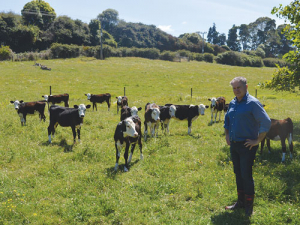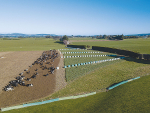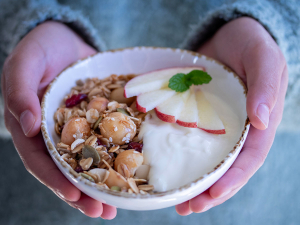After 23 years of rearing calves, Ian Farrelly is ready to take the successful business to another level.
With the 485ha farm nestled at the base of Mount Kakepuku, an old volcanic cone, tourism is on the mind of the former ASB banking executive and company director.
Farrelly Calf Rearing is a thriving business; 10,000 calves are reared annually and sold to farmers throughout the country. Week-old calves are bought from saleyards; they are fed milk for six weeks and then introduced to pasture and grain for another six weeks before being offloaded.
Farrelly, who stepped down from the Fonterra board last December after a nine-year stint, was planning on a more hands-on role on the farm this year. However, another Fonterra director Michael Spaans stepped down due to poor health and Farrelly was parachuted by the board to cover for him until the annual meeting in December.
Farrelly believes there’s a real opportunity for tourism.
“There are a lot of requests to come and look at our calf rearing operations; lot of requests from offshore,” he told Dairy News.
The sprawling farm already has three large specialist calf sheds; Farrelly is planning on building a fourth specially to cater for tourists along with a large café where visitors can come by buses or cars.
The adjoining Mount Kakepuku, with stunning views across the Waikato, provides another attraction for bus tours.
“I’m keen to take the business to another level; rear more calves and keep reinvesting in the business with tourism being one of the opportunities.”
Farrelly Calf Rearing started as a small business and had its early challenges. Farrelly recalls buying 70 calves and losing about 20% of them during the first year.
He says the company resolved not to expand until it had mastered the art of calf rearing. For the next five years 200 calves were reared annually; no calves were lost and top quality animals left the farm.
“The mistake many tend to make is that we try to grow to get away from the problems; we stayed put, learnt from our mistakes and then expanded from 200 to 1000 and bought more land”
Farrelly handles calf sales, leaving the running of the farm to his farm manager and 11 staff. Calves start arriving April and the last batch arrives in October; they are sold all-year round.
Milk is bought from farmers around Waikato to feed the calves. The calves go through 5000 bales of hay and 800 tonnes of meal during the year; half of which is made on the farm and rest bought-in.
Farrelly says the key in the business is ensuring calves arrive on their new farms ready to grow.
“So we prepare the calves very well for sale; they are weaned off milk at six weeks but they are only fed once a day milk and that encourages them to develop the rumen quite a bit earlier than they normally would.”
Having lots of land means calves on the farm are exposed to pasture early.
“So once we have weaned them off milk after six weeks they are predominantly eating grass; supplemented with grain and hay right through.”
Farrelly’s farm also sells 2000 dairy heifers annually; some of these heifers have ended up in China.
The dairy downturn over the past two seasons hasn’t impacted the business; it has remained profitable by buying and selling at a margin.
Farrelly has continued to re-invest in the business over the years; buying seven adjoining farms planting 1000 native trees annually and in the last 12 months putting in a $50,000 effluent system.
Farrelly still has a penchant for serving on boards; he remains a director of five other companies, including Spectrum Dairies, a dairy farm operator. Farrelly has shares in the company which produces 3.5million kgMS in both Canterbury and the Waikato.

















